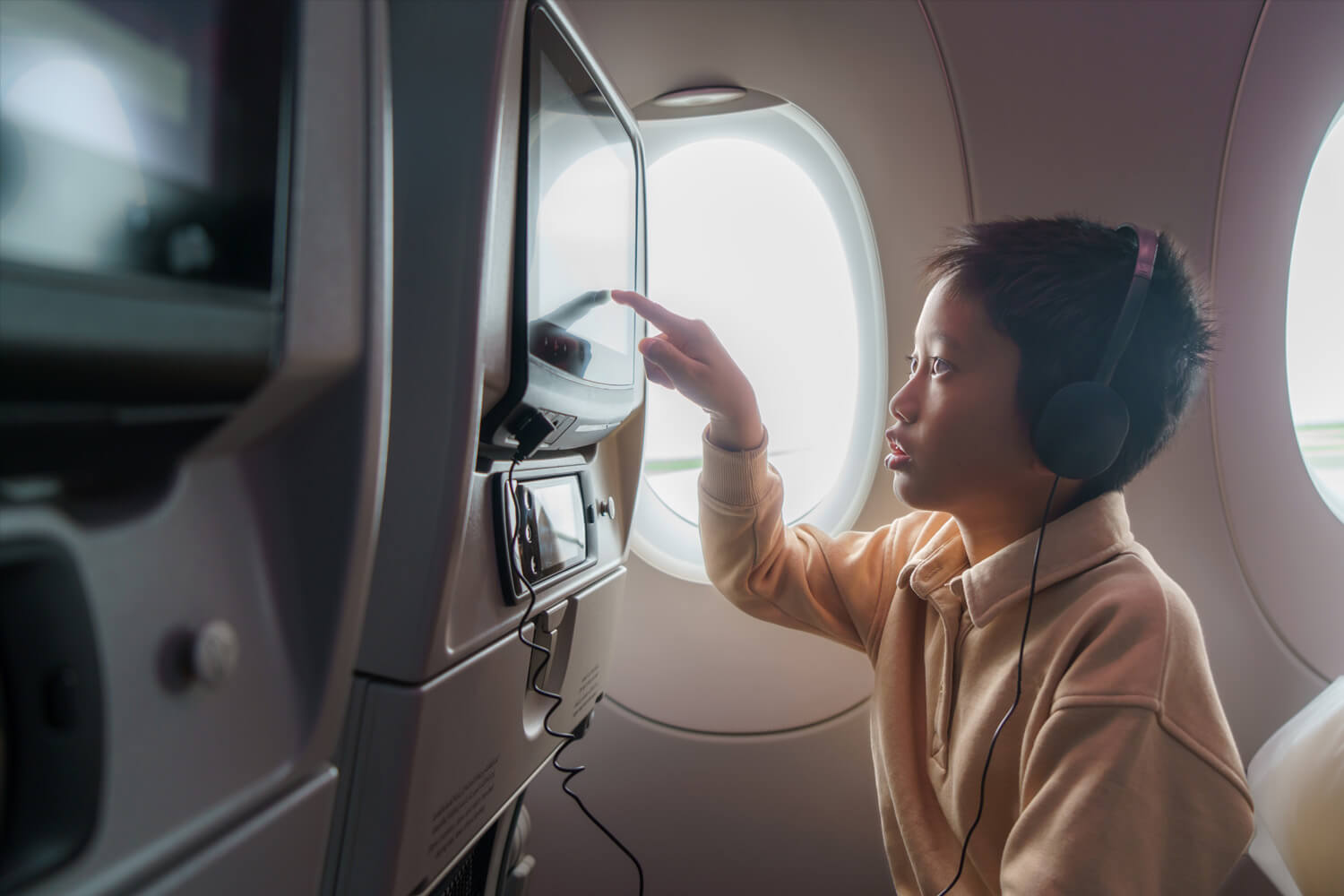Travel Laws for Minors – What Parents Need to Know

Let’s say you are packing your child's suitcase for their first solo trip to visit grandparents. As you fold their clothes, worry creeps in. Do you have the right papers? Will they be allowed to fly? What if something goes wrong?
You're not alone. Travel laws for minors can feel confusing and scary. But knowing the rules before your child heads out helps to protect your child and prevent travel problems. Airlines have strict rules. TSA has guidelines. Other countries have their own laws. These are all things that you need to familiarize yourself and your child with before they depart.
Dan Mantzaris, a LegalShield provider lawyer with DSK Law Group, has this to share:
“Often parents, especially with older minors, do not realize that although the minor may be mature enough to speak for themselves or make most of their own decisions, individuals in authority they may encounter are in many instances prohibited from allowing the minor to act on their own behalf or make their own decisions.”
This guide explains exactly what you need to know before you send your young one out on their own. We'll cover what documents are needed and how to avoid travel delays. With the right information, you can send your child off with confidence.

What are the rules for traveling with a minor?
Minors can travel, but the rules depend on three things: their age, where they're going, and who they're traveling with.
Domestic travel within the United States is easier than international travel. The rules are simpler and there are fewer documents needed.
The requirements change based on who the child travels with:
- Both parents: Usually the easiest option
- One parent: May need extra paperwork
- No parents: Requires the most documentation
Understanding these basic categories helps you prepare the right papers for your trip.
What does TSA require for minors to fly?
TSA guidelines for traveling with infants and children are fairly straightforward for domestic flights. Children under 18 don't need ID when traveling with an adult who has proper identification.
Mantzaris adds,
“Although it may not be required, we recommend our clients obtain a passport for their minor child if they are regularly traveling by themselves or without both parents. A passport is universally accepted as identification and since many minors are too young to have a state-issued picture ID having a passport will help alleviate concerns that TSA or others in authority may have.”
However, TSA may ask teens aged 16-17 to show ID. This happens more often when they look older or travel alone. It's smart to bring ID just in case.
When you travel with minor children, TSA allows special items:
- Baby formula and breast milk (no size limits)
- Strollers and car seats
- Diaper bags with extra supplies
Remember that TSA requirements are different from airline rules. TSA handles security, while airlines set their own policies for unaccompanied minors.

What documents do minors need to travel?
The answer to this question depends on who is traveling with the child. Different situations require different paperwork, which we will lay out for you below.
Traveling without parents
Laws for minors to travel without parent supervision are strict. Most airlines and countries want proof that parents gave permission.
You'll typically need these documents:
- Notarized consent letter from both parents
- Birth certificate (certified copy)
- Passport for international travel
- Notarized Medical consent form executed by both parents in case of emergency
Mantzaris says,
“If the minor is visiting relatives or part of an organized travel program, we recommend that the medical consent form specifically identify the individual or individuals who will be in temporary custodial care of the minor. Parents should consult an attorney to ensure the document is legally enforceable.”
Getting a child travel and medical consent form notarized is very important. This legal step proves the document is real and parents truly gave permission.
International travel without parents requires even more paperwork. Some countries won't let children enter without proper consent forms.
Traveling with one parent
Does a minor need parental consent to travel with just one parent?
Often, yes. Many airlines and border agents want a letter from the other parent who is not traveling. This ensures parental permission and helps to protect the minor from abduction due to an oversight.
The consent letter should include:
- Travel dates and destinations
- Contact information for both parents
- Child's full name and birth date
- Signature of the non-traveling parent
- Authorization letter that has been notarized
This rule exists to prevent child abduction. Even divorced parents may need consent from their ex-spouse. The letter should be notarized to make it official.
Mantzaris shares,
“In situations where parents are divorced, the parent must review the divorce decree and any specific notification and consent requirements that may be in the decree related to travel. Additionally, the parent wishing to travel or to authorize the minor to travel without a parent should communicate with the other parent as soon as possible. Waiting until the last minute may result in the parent not giving consent and require further steps including seeking court permission for the minor's travel.”
Traveling with both parents
When both parents travel together, you usually don't need extra consent forms. However, you should still carry proper identification and your child's documents.
Bring a valid ID for both parents as well as the child’s birth certificate or passport. If the parents are divorced, make sure you bring any custody papers.
Having all documents ready prevents delays at security checkpoints and border crossings.
Additional considerations for adopted minors
Mantzaris tells us that if a minor child is adopted and traveling with one or both parents, the parents should have a copy of the minor's Adoption Order, Judgment or Decree.
“In travel and non-travel situations, we have had to assist clients who had to present an adoption order to prove they are the minor’s legal parent. Unfortunately, this has occurred when the minor is of a different race or national origin than the parents.”

International travel rules for minors
Can a minor travel internationally without a parent?
Yes, but international travel laws for minors are much stricter than domestic rules. Each country sets its own requirements. Since rules vary depending on destination and the minor’s age, it is important to check beforehand with the airline, with the U.S. Department of State, and with the embassy or consulate of the country where the minor is traveling. This way, you can know exactly what is needed as you begin planning.
Most countries require these documents for unaccompanied minors:
- Valid passport (required for all international travel)
- Notarized parental consent from both parents
- Visas if the destination country requires them
- Emergency contact information
Popular destinations have specific rules:
- Mexico: Requires notarized consent for minors under 18
- Canada: Wants consent letters for children traveling alone
- European Union: May require consent forms and proof of accommodation
It’s wise to consult with a lawyer who can help you find out the rules for the specific area to which you will be traveling.
Additional international considerations
Some countries require consent letters to be certified by their embassy or consulate. This process takes extra time, so start early.
Border agents can deny entry to children without proper paperwork. Even if the airline lets them fly, the destination country might send them back.
Authorization for a minor to travel internationally should always include emergency contact information and medical details. This helps if problems arise while traveling. The minor can more promptly receive medical help if necessary, while caretakers in that country can get in touch with you or any other emergency contacts.
Mantzaris states that parents should enroll the minor in the Department of State Smart Traveler Enrollment Program. Among other benefits, this enables the Department of State to quickly contact parents in the event of an emergency.
Airline rules for minors traveling alone
Airlines have their own unaccompanied minor policies. These rules are separate from TSA guidelines and government requirements.
Most airlines group children by age:
- Under 5 years old: Usually cannot fly alone
- Ages 5-11: Must use unaccompanied minor service
- Ages 12-17: May fly alone but can still use the service
Unaccompanied minor services include:
- Special check-in procedures
- Airport escort to the gate
- Flight attendant supervision
- Supervised pickup at destination
Airlines charge fees for these services, typically $50-150 each way. Some airlines require advance booking and have limited flights available. Check with the airline of your choice well in advance before making any solid plans, just to make sure you know the rules.
Can a minor travel without parents at 16?
Many airlines allow 16-17 year olds to fly alone domestically without special services. They're treated more like adults for domestic travel within the United States.
However, international travel is different. Most countries still consider 16-year-olds as minors who need parental consent to enter.
Teens and their parents should check airline policies before booking, as well as verify destination country requirements. Make sure to send your teen with the proper, signed consent forms for international trips. Your teen should carry emergency contact information in case the unexpected occurs during their trip.
Even experienced teen travelers should have authorization for minor to travel documents when crossing borders.

Preparing for safe and legal travel with minors
Travel laws for minors exist to keep children safe. While the rules may seem complex, following them protects your family and prevents travel problems.
With proper planning and the right documents, family travel goes smoothly. Start gathering paperwork early to avoid last-minute stress.
When legal questions arise about travel documents or family law issues, having professional help makes a difference. LegalShield personal plans allow families access to legal consultation and advice on unlimited personal legal matters for a fraction of traditional law firm hourly rates, providing legal advice on personal legal issues from lawyers with an average of 22 years of experience.
Whether you need help understanding consent forms, reviewing travel documents, or handling family law concerns related to custody and travel permissions, LegalShield covers you for around a dollar per day, giving you access to an entire law firm.
Ready to protect your family's legal interests while traveling? Visit LegalShield.com today to explore affordable legal plans that give you peace of mind before, during, and after your travels.
Written by Elyse Dillard, Content Specialist at LegalShield. Elyse creates educational resources about legal and identity theft protection services. She works to make complex legal concepts more accessible to readers and has contributed to numerous articles on the LegalShield blog.
Dan Mantzaris concentrates his practice in the areas of local government, land use and zoning, and general business. Since his admission to The Florida Bar in 1986, Dan has represented clients in matters related to real estate development, corporations, contracts, property rights and eminent domain, civil and commercial litigation, personal injury and casualty defense, personal injury claims, employment discrimination defense and international adoptions.
Pre-Paid Legal Services, Inc. ("PPLSI") provides this blog as a public service and for general information only. The information made available in this blog is meant to provide general information and is not intended to provide legal advice, render an opinion, or provide a recommendation as to a specific matter. The blog post is not a substitute for competent legal counsel from a licensed professional lawyer in the state or province where your legal issues exist, and you should seek legal counsel for your specific legal matter. All information by authors is accepted in good faith. However, PPLSI makes no representation or warranty of any kind, express or implied, regarding the accuracy, adequacy, validity, reliability, availability, or completeness of such information. The materials contained herein are not regularly updated and may not reflect the most current legal information. No person should either act or refrain from acting on the basis of anything contained on this website. Nothing on this blog is meant to, or does, create an attorney-client relationship with any reader or user. An attorney-client relationship may be formed only after the execution of an engagement letter with an attorney and after that attorney has confirmed that no conflicts of interest exist. Nothing on this website, or information contained or transmitted by this website, is intended to be an advertisement or solicitation. Information contained in the blog may be provided by authors who could be a third-party paid contributor.
PPLSI provides access to legal services offered by a network of provider law firms to PPLSI members through membership-based participation. Neither PPLSI is not a law firm, and its officers, employees or sales associates do not directly or indirectly provide legal services, representation, or advice.
LegalShield is a trademark of Pre-Paid Legal Services, Inc. (“LegalShield”). LegalShield provides this blog as a public service and for general information only. The information made available in this blog is meant to provide general information and is not intended to provide legal advice, render an opinion, or provide a recommendation as to a specific matter. The blog post is not a substitute for competent legal counsel from a licensed professional lawyer in the state or province where your legal issues exist, and you should seek legal counsel for your specific legal matter. All information by authors is accepted in good faith. However, LegalShield makes no representation or warranty of any kind, express or implied, regarding the accuracy, adequacy, validity, reliability, availability, or completeness of such information. The materials contained herein are not regularly updated and may not reflect the most current legal information. No person should either act or refrain from acting on the basis of anything contained on this website. Nothing on this blog is meant to, or does, create an attorney-client relationship with any reader or user. An attorney-client relationship may be formed only after the execution of an engagement letter with an attorney and after that attorney has confirmed that no conflicts of interest exist. Nothing on this website, or information contained or transmitted by this website, is intended to be an advertisement or solicitation. Information contained in the blog may be provided by authors who could be a third-party paid contributor. LegalShield provides access to legal services offered by a network of provider law firms to LegalShield members through membership-based participation. LegalShield is not a law firm, and its officers, employees or sales associates do not directly or indirectly provide legal services, representation, or advice.



